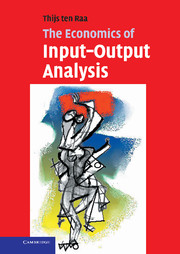Book contents
- Frontmatter
- Contents
- List of figures
- List of tables
- Preface
- Glossary
- 1 Introduction
- 2 Input-output basics
- 3 Multiplier effects
- 4 Linear programming
- 5 Are input-output coefficients fixed?
- 6 The System of National Accounts
- 7 The construction of technical coefficients
- 8 From input-output coefficients to the Cobb–Douglas function
- 9 The diagnosis of inefficiency
- 10 Input-output analysis of international trade
- 11 Environmental input-output economics
- 12 Productivity growth and spillovers
- 13 The dynamic inverse
- 14 Stochastic input-output analysis
- Solutions to exercises
- Index
- References
4 - Linear programming
Published online by Cambridge University Press: 18 December 2009
- Frontmatter
- Contents
- List of figures
- List of tables
- Preface
- Glossary
- 1 Introduction
- 2 Input-output basics
- 3 Multiplier effects
- 4 Linear programming
- 5 Are input-output coefficients fixed?
- 6 The System of National Accounts
- 7 The construction of technical coefficients
- 8 From input-output coefficients to the Cobb–Douglas function
- 9 The diagnosis of inefficiency
- 10 Input-output analysis of international trade
- 11 Environmental input-output economics
- 12 Productivity growth and spillovers
- 13 The dynamic inverse
- 14 Stochastic input-output analysis
- Solutions to exercises
- Index
- References
Summary
Introduction
Linear programming is a chapter of applied mathematics concerned with the maximization (or minimization) of a linear function, subject to linear constraints. A key role is designated to the Lagrange multipliers. In economics, these are the marginal productivities of the constraining entities. Our development of the theory of linear programming is made through an analysis of the Lagrange multipliers. The multipliers are constructed on the basis of inequality implications (sections 4.2 and 4.3) and yield an intuitive and simple derivation of the main results (sections 4.4 and 4.5). The remaining sections characterize the multipliers (section 4.6), identify the active variables (section 4.7), and provide an economic interpretation in terms of scarcity (section 4.8).
Inequality implications
There is a close connection between linear programs and inequality implications. An inequality implication states that one set of inequalities implies another inequality. For example, the inequality pair x1 ≥ 0 and x2 ≥ 0 clearly implies the new inequality x1 + x2 ≥ 0. A linear program can be designed in this framework. If a point is feasible, meaning that it fulfills the inequalities of the constraints, it is implied that the value of the linear function is less than or equal to the optimal value. Lemma 4.1 will reveal the structure of inequality implications, contains the seed of the Lagrange multipliers, and enable us to quickly derive the main results of the theory of linear programming.
- Type
- Chapter
- Information
- The Economics of Input-Output Analysis , pp. 37 - 53Publisher: Cambridge University PressPrint publication year: 2006



